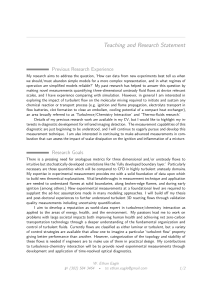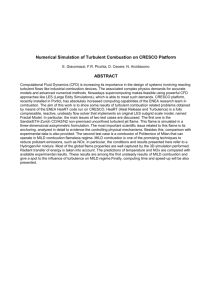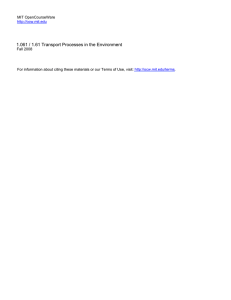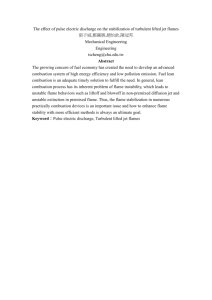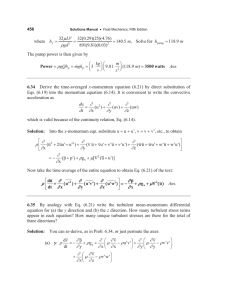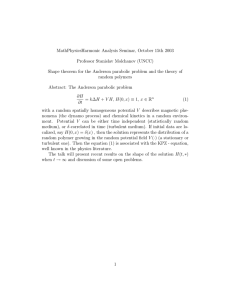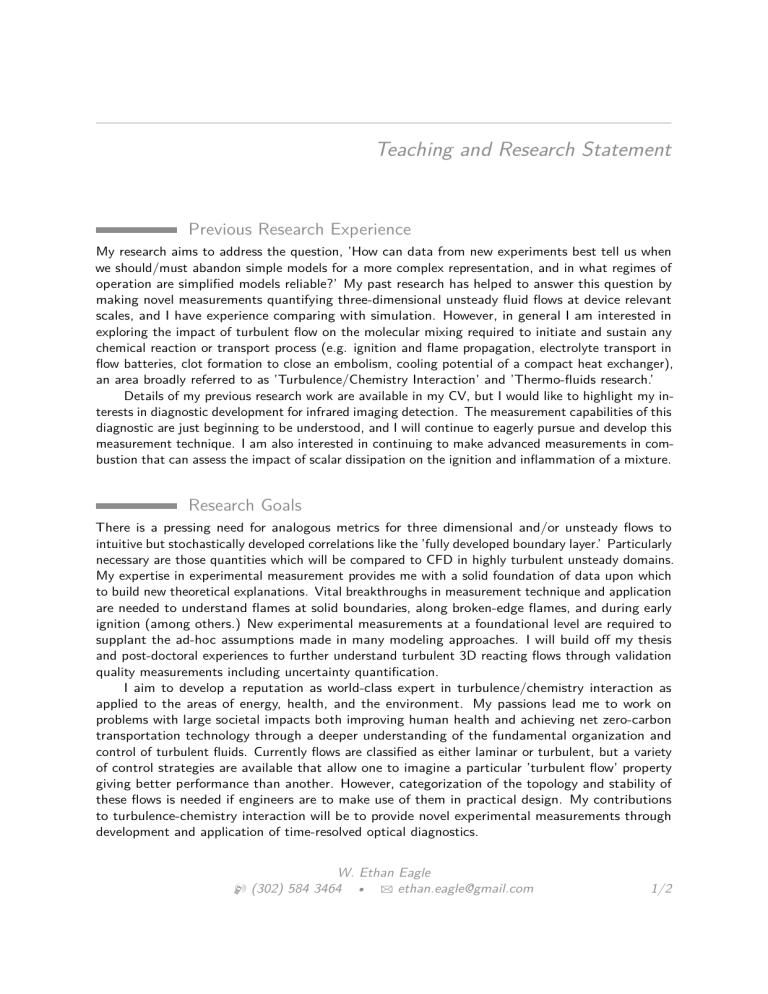
Teaching and Research Statement Previous Research Experience My research aims to address the question, ’How can data from new experiments best tell us when we should/must abandon simple models for a more complex representation, and in what regimes of operation are simplified models reliable?’ My past research has helped to answer this question by making novel measurements quantifying three-dimensional unsteady fluid flows at device relevant scales, and I have experience comparing with simulation. However, in general I am interested in exploring the impact of turbulent flow on the molecular mixing required to initiate and sustain any chemical reaction or transport process (e.g. ignition and flame propagation, electrolyte transport in flow batteries, clot formation to close an embolism, cooling potential of a compact heat exchanger), an area broadly referred to as ’Turbulence/Chemistry Interaction’ and ’Thermo-fluids research.’ Details of my previous research work are available in my CV, but I would like to highlight my interests in diagnostic development for infrared imaging detection. The measurement capabilities of this diagnostic are just beginning to be understood, and I will continue to eagerly pursue and develop this measurement technique. I am also interested in continuing to make advanced measurements in combustion that can assess the impact of scalar dissipation on the ignition and inflammation of a mixture. Research Goals There is a pressing need for analogous metrics for three dimensional and/or unsteady flows to intuitive but stochastically developed correlations like the ’fully developed boundary layer.’ Particularly necessary are those quantities which will be compared to CFD in highly turbulent unsteady domains. My expertise in experimental measurement provides me with a solid foundation of data upon which to build new theoretical explanations. Vital breakthroughs in measurement technique and application are needed to understand flames at solid boundaries, along broken-edge flames, and during early ignition (among others.) New experimental measurements at a foundational level are required to supplant the ad-hoc assumptions made in many modeling approaches. I will build off my thesis and post-doctoral experiences to further understand turbulent 3D reacting flows through validation quality measurements including uncertainty quantification. I aim to develop a reputation as world-class expert in turbulence/chemistry interaction as applied to the areas of energy, health, and the environment. My passions lead me to work on problems with large societal impacts both improving human health and achieving net zero-carbon transportation technology through a deeper understanding of the fundamental organization and control of turbulent fluids. Currently flows are classified as either laminar or turbulent, but a variety of control strategies are available that allow one to imagine a particular ’turbulent flow’ property giving better performance than another. However, categorization of the topology and stability of these flows is needed if engineers are to make use of them in practical design. My contributions to turbulence-chemistry interaction will be to provide novel experimental measurements through development and application of time-resolved optical diagnostics. W. Ethan Eagle H (302) 584 3464 • B ethan.eagle@gmail.com 1/2 To be successful as a starting faculty, I plan to start from simple ’unit’ problems where I can explore the influence of boundary conditions in simple flow problems while developing diagnostic capability (e.g. infrared measurements of hydrocarbon distribution in atmospheric jet flames). After demonstrating success there, I will move to intermediate ’surrogates’ to explore coupling in the physics between two or more ’unit’ influences (direct injection spray combustion measurements in a rapid compression machine), and finally design experiments at prototype scales (e.g. high-pressure premixed lean-burn GE:TAPS combustor, or an optically accessible IC Engine) bringing together all of the above but often including an onerous requirement to attempt to ’measure everything all the time.’ I welcome a chance to discuss my research plans in more depth with faculty colleagues during a campus visit. I also plan to leverage my connections at Sandia to continue a relationship of data sharing, publishing, and prototype-scale facility access. Data analysis including uncertainty quantification underlie all of my research and publication plans. I have contacts to funding sponsors at the DOE, with NSF program managers in the turbulence and combustion sub-areas, and at DOD including AFRL and NRL, and will seek the support of these agencies through responses to FOAs regularly put out by these venues. I would be interested in exploring collaborative research with others outside my discipline and I also plan to vigorously pursue NSF, DOD, and DOE career awards, as well as NSF equipment funds. Furthermore, I recognize the importance of recruiting and mentoring graduate students to make my research plans a success. In particular, I am committed to responsible and safe conduction of research and to recruiting from a diverse pool of students. I plan to quickly develop positive working and mentoring relationships to enhance both my own and my student’s success. Teaching My teaching interests span experiments in fluids, theoretical fluid dynamics, thermodynamics, and combustion. I won College of Engineering, and Rackham Graduate School outstanding instructor awards while at Michigan and I enjoy interactions with students, and look forward to inviting undergraduates from the classroom into the research lab. While I am able to teach a wider range of introductory courses at the undergraduate level if necessary, I would feel most comfortable starting in the areas of experimental and theoretical fluid dynamics. I feel I could teach the following courses with a high level of expertise: • Undergraduate: Thermodynamics, In/compressible Flows, Instrumentation (Lab), Combustion • Graduate: Turbulent-Compressible-Viscous Flows, Combustion, Optical and Laser Diagnostics I believe that a comprehensive set of courses on fundamental viscous and turbulent flows would be a worthwhile addition to a core competency at the undergraduate level. Drawing motivation from sustainable practices used aboard the space station, I am also interested in developing innovative courses that are applicable to sustainability in engineering. Finally, I propose an graduate level technical communications class. Topics would include giving technical presentations, and technical writing and reviewing, and an assignment to prepare an NSF-like fellowship grant proposal. The students will read current journal articles in their area of study, practice writing article reviews, and present summary (review) lectures on these advanced topics. Although my experience is in the context of fluids, the class could be thought of as graduate research program development as well as practice at professionalization for students. I cultivate the following attitudes in students who complete course work or research with me: • demonstrate understanding of rigorous mathematical tools for design/analysis, (Teach others) • exhibit audience driven communication strategies, (Justify and explain the importance of research) • establish sound environmental/ethical/social reasoning. (Think long term, not just short term) W. Ethan Eagle H (302) 584 3464 • B ethan.eagle@gmail.com 2/2
